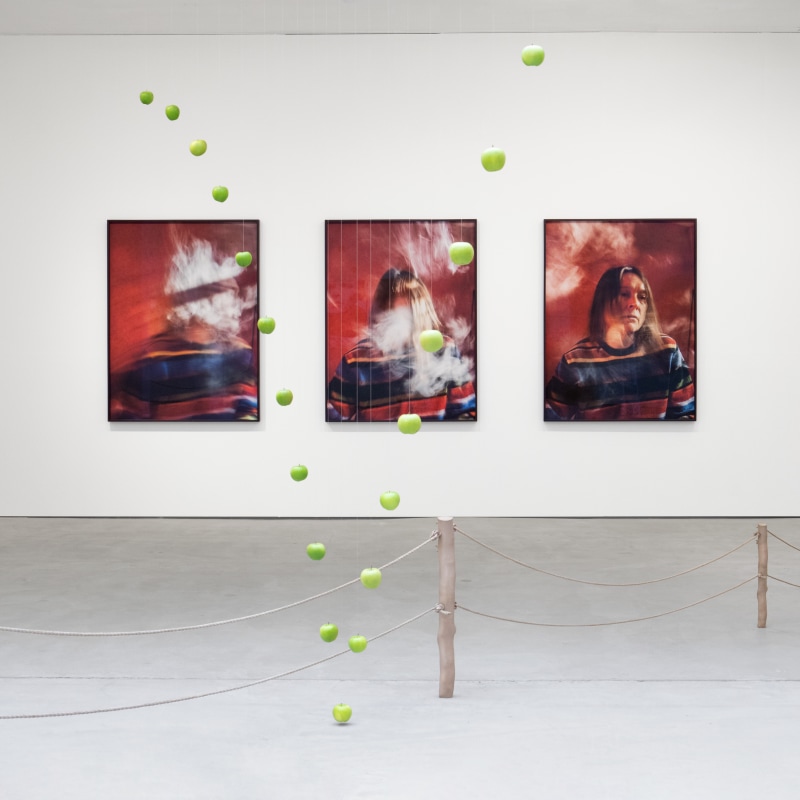Sadie Coles HQ is pleased to announce REPEATER, an exhibition about repetition and difference. Encompassing a wide range of artists, the show examines ideas of sequence, seriality and replication – whether in the form of modular sculpture, painting in series, or digital reproduction – in order to highlight the potential that exists in the act of repeating.
The show demonstrates how repetition generates plurality as much as sameness. Sequence as a conceptual mode is reflected in the algorithm-derived grids of Michele Abeles’s B&W prints of 2014, in which representational imagery has been ‘encrypted’ into a series of black and white tessellations. Photographs printed on acetate cling to the works’ surfaces like afterthoughts or random interpolations, skewering the abstract uniformity. Throughout the display, variation and similitude operate in tandem – or in tension. Hilary Lloyd’s Moon (2011) collates multiple images of the moon, filmed from fractionally different angles and for differing durations, into a mosaic of glowing circles; this overall format is itself doubled across two separate screens. In Sarah Lucas’s photographic self-portraits Red Sky Gha (2018), the artist herself is the subject of vision and revision. Akin to the bodies that repeat and morph across the triptychs of Francis Bacon, she veers in and out of focus, alternately revealed and obscured.
Many works in the exhibition explore the relationship that exists, in any sequence, between part and whole. Monster Chetwynd’s Bat Opera paintings take the bat as their leitmotif; the animals are imagined in a host of cinematic, Baroque scenarios, always on a miniature scale. Just as in each picture the lowly creature is subsumed into an epic scheme, the individual paintings accumulate into an operatic totality. In the new jigsaw sculptures of Alex Da Corte, the emblem of a plant pot and knife harnesses a ‘Pop’ ethos of seriality to a more emotive and playful register. Laura Owens’s paintings of drop-shadowed glyphs – computerized marks that dematerialise against white grounds – use an interplay of repetition and variety to foreground the relationship between the digital and the gestural.
The exhibition also examines the idea of the sculptural unit as a means of establishing rhythm and order – or disrupting those structures. In Jim Lambie’s Sonic Reducer series – concrete blocks collaged with record spines – the semblance of minimalist repetition is subverted by the way in which each sculpture appears to sink into the ground at a lurching angle.
The works in the exhibition highlight, in various ways, how the regularity of an artistic sequence often carries with it a contrary impulse – a sense of disorder, or anomaly, or unrepeatability. In the new paintings of Uri Aran, sequence offers the possibility of glimpsing discrete psychological states or moods. In his series The Fastest Boy In The World, gestural oil paint overruns and effaces an underlying composition – wavering between automatism and a sense of fragile design. These twin elements are discernible also in the canvases of Victoria Morton, in which the reduplication of colour and gesture takes on a near-musical quality, alternately rhythmic and fitful. Elsewhere, juxtaposed images of the same person – Elizabeth Peyton’s twin monotypes George (2021), for example, or TJ Wilcox’s three headshots of Jerry Hall from 2017 (enlarged and backlit to suggest latter-day ‘Marilyns’) – imply the way in which a human subject changes, second by second, in the eye of the beholder.
